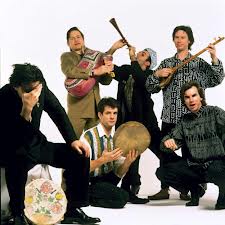About 10 years ago bookstores in Australia promoted a new guide book to a little heard of country, Molvania. Put together as a spoof of the Balkans and of travel guide books in general, the author’s spun ridiculous, crude and often funny snippets of mis-information about this made up land.
The Republic of Molvanîa is a composite of many of the worst stereotypes and clichés about Eastern Europe held by people in Australia (like Russkies, wogs or Hunyaks). The exact location of Molvanîa is never specified. It is said to border Germany, Slovakia, Slovenia, Hungary and Romania. The shape of the country with its divisions strongly suggests Moldova, and the name has similarities (as has the location description by the authors as “somewhere between Romania and downwind from Chernobyl“); it can also represent a composite country consisting of parts of Hungary, Czech Republic, Croatia, Serbia, Slovakia and perhaps Austria and Poland). The book mentions Bulgarians, Hungarians and perhaps Moldovans (ethnic Romanians) as its inhabitants: “The Molvanian population is made up of three major ethnic groups: the Bulgs (68%) who live predominantly in the centre and south, the Hungars (29%) who inhabit the northern cities, and the Molvs (3%) who can be found mainly in prison.”
The book describes the nation as having been a desolate wasteland for much of its history, similar to Russia since the 12th century, torn by civil war and ethnic unrest. Eventually Molvanîa’s various warring factions were united as a single kingdom, ruled by a series of cruel despotic kings. In the late 19th century the monarchy was overthrown, but the royal family remained popular in exile. During World War II the country was allied with Nazi Germany, and then afterwards was occupied by the Soviet Union, who set up a Communist puppet government. After the fall of European Communism in the 1990s, the country became a dictatorship run by a corrupt government with heavy ties to the Mafia.
Molvanîa is described as a very poor and rural country, heavily polluted and geographically barren. The infrastructure is terrible, with necessities such as electricity, clean water, and indoor plumbing being rare finds, largely due to bureaucratic incompetence. Though the travel guide tries to suggest otherwise, there is little to do in the country, the hotels are tiny, filthy and dilapidated, the ethnic cuisine disgusting, and the “tourist attractions” boring and overpriced. (Wikipedia)
The book struck a particular chord of humour in some people’s hearts but others found it offensive, though no one could really say who was being offended because the country and all its ‘facts’ were made up.
 Beginning in the early 80’s, for about a decade, a similar scam was foisted upon ignorant and unsuspecting people. It was a group of musicians who went by the name of 3 Mustaphas 3who insisted they were Balko-Turkic nephews of a minor Pasha from a strangely named and incredibly obscure country. They insisted on being called things like Kemal, Isfahani and Ahmet but played every sort of gypsy and folk instrument known to man. The music they made was lively, full of exotic sounds and a familiar rocking beat. These guys knew how to have fun. And they were a far sight more interesting and humorous then the Australian piss take book.
Beginning in the early 80’s, for about a decade, a similar scam was foisted upon ignorant and unsuspecting people. It was a group of musicians who went by the name of 3 Mustaphas 3who insisted they were Balko-Turkic nephews of a minor Pasha from a strangely named and incredibly obscure country. They insisted on being called things like Kemal, Isfahani and Ahmet but played every sort of gypsy and folk instrument known to man. The music they made was lively, full of exotic sounds and a familiar rocking beat. These guys knew how to have fun. And they were a far sight more interesting and humorous then the Australian piss take book.
Other albums by 3M3 are better than this one we share tonight but everything they did was good. In this collection they rework some of their best known ditties and throw in a few unheard melodies sung in French, Arabic and other non-English languages. Always worth your time, are the boys from the Balkans (and Britain).
Track Listing:
01 Si Vous Passez Par Là
02 !Starehe Mustapha! I, II & III
03 Maldita Guajira
04 Linda, Linda (Ach ya Linda)
05 Kopanitsa
06 Linda, Linda [Szegerely Megarely Mix]
07 Fiz’n [DJ Trouble Fezz re-edit]
08 Bukë E Kripë Në Vatër Tonë _ Kalaxhojnë
09 Anapse To Cigaro
10 Shouffi Rhirou
11 Niska Banja
12 Kač Kuzulu Čeylan
13 Selma






